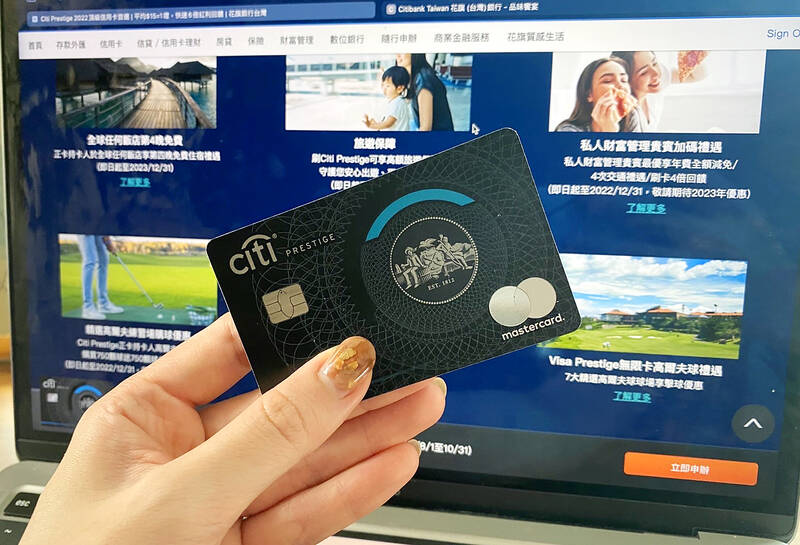Holders of Citi Prestige credit cards are entitled to deluxe options for dining, golf driving ranges, traveler insurance and a limited-quantity offer of Shin Kong Mitsukoshi Department Store (新光三越百貨) coupons worth NT$18,000 each.
As the COVID-19 pandemic eases, Citibank Taiwan Ltd (台灣花旗) has unveiled benefit packages for travelers with Citi Prestige, the bank announced in a news release on Friday last week.
Cardholders may dine with a plus one without incurring additional charge at a Citibank partner establishment, including Sheraton Grand Hotel Taipei’s (台北喜來登大飯店) Kitchen 12, Guest House, The Dragon, Pizza Pub, Antoine Room, Sukhothai and Momoyama; and My Humble House and Latest Recipe at Le Meridien Taipei (台北寒舍艾美酒店), among others.

Photo courtesy of Citibank Taiwan Ltd
Users of the card are also entitled to a gratis of 750 golf balls upon purchasing the same number at six partnered driving ranges in the country. These perks and many more are available to cardholders from the autumn through the last months of next year.
Citi Prestige offers premium rewards, fine dining, luxury hotel, seamless travel and personalized concierge to its most select clientele. Making the rewards more available to cardholders, six credits are awarded for every NT$30 spent on an international or domestic purchase, a reward equivalent to one mile of mileage per NT$15 of spending.
For international travel, Citi Prestige cardholders may enjoy eight rides to and from airports free of charge a year that can be exchanged for domestic high-speed or regular rail tickets on a one-to-one basis, in addition to two hours of chauffeuring services.
Cardholders may also receive 30 days of free parking in five-day increments at international airports a year.
Further, Prestige Card members are entitled to a complimentary fourth night of stay at any hotel in the world as well as the Citi Prestige concierge service, which is available 24 hours a day.
To ensure the travel safety of Citi Prestige cardholders, the bank offers its members up to NT$50 million of travel insurance for public transportation and up to NT$10 million in full-trip travel insurance, alongside travel medical insurance coverage of up to NT$300,000.
Marking the eighth anniversary of the Citi Prestige program, the bank is rolling out the biggest bonuses this year for new accounts, starting on the day of the announcement to Oct. 31.
New clients who have accumulated 100,000 of spending in regular transactions and paid all fees within 60 days of the account’s opening are qualified for a limited offer of 800 Shin Kong Mitsukoshi coupons worth NT$18,000 each.
Meanwhile, eligible members who did not get a coupon would instead receive 15,000 in bonus credits.
Moreover, Citigold members are eligible for 30,000 credits in Citi ThankYou Rewards.
For more information, visit the official Web site for Citi Prestige Card at www.citibank.com.tw/citiprestige.
The revolving interest rates for Citibank credit cards ranges from 6.88 percent to 15 percent, while processing fees for cash advances are 3.5 percent of the sum of the cash advance plus NT$100. For information about other fees, visit Citibank at www.citibank.com.tw.

Three experts in the high technology industry have said that US President Donald Trump’s pledge to impose higher tariffs on Taiwanese semiconductors is part of an effort to force Taiwan Semiconductor Manufacturing Co (TSMC, 台積電) to the negotiating table. In a speech to Republicans on Jan. 27, Trump said he intends to impose tariffs on Taiwan to bring chip production to the US. “The incentive is going to be they’re not going to want to pay a 25, 50 or even a 100 percent tax,” he said. Darson Chiu (邱達生), an economics professor at Taichung-based Tunghai University and director-general of

‘LEGACY CHIPS’: Chinese companies have dramatically increased mature chip production capacity, but the West’s drive for secure supply chains offers a lifeline for Taiwan When Powerchip Technology Corp (力晶科技) entered a deal with the eastern Chinese city of Hefei in 2015 to set up a new chip foundry, it hoped the move would help provide better access to the promising Chinese market. However, nine years later, that Chinese foundry, Nexchip Semiconductor Corp (合晶集成), has become one of its biggest rivals in the legacy chip space, leveraging steep discounts after Beijing’s localization call forced Powerchip to give up the once-lucrative business making integrated circuits for Chinese flat panels. Nexchip is among Chinese foundries quickly winning market share in the crucial US$56.3 billion industry of so-called legacy

Hon Hai Precision Industry Co (鴻海精密) is reportedly making another pass at Nissan Motor Co, as the Japanese automaker's tie-up with Honda Motor Co falls apart. Nissan shares rose as much as 6 percent after Taiwan’s Central News Agency reported that Hon Hai chairman Young Liu (劉揚偉) instructed former Nissan executive Jun Seki to connect with French carmaker Renault SA, which holds about 36 percent of Nissan’s stock. Hon Hai, the Taiwanese iPhone-maker also known as Foxconn Technology Group (富士康科技集團), was exploring an investment or buyout of Nissan last year, but backed off in December after the Japanese carmaker penned a deal

WASHINGTON POLICY: Tariffs of 10 percent or more and other new costs are tipped to hit shipments of small parcels, cutting export growth by 1.3 percentage points The decision by US President Donald Trump to ban Chinese companies from using a US tariff loophole would hit tens of billions of dollars of trade and reduce China’s economic growth this year, according to new estimates by economists at Nomura Holdings Inc. According to Nomura’s estimates, last year companies such as Shein (希音) and PDD Holdings Inc’s (拼多多控股) Temu shipped US$46 billion of small parcels to the US to take advantage of the rule that allows items with a declared value under US$800 to enter the US tariff-free. Tariffs of 10 percent or more and other new costs would slash such